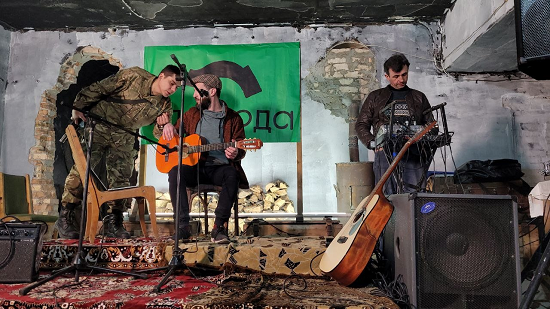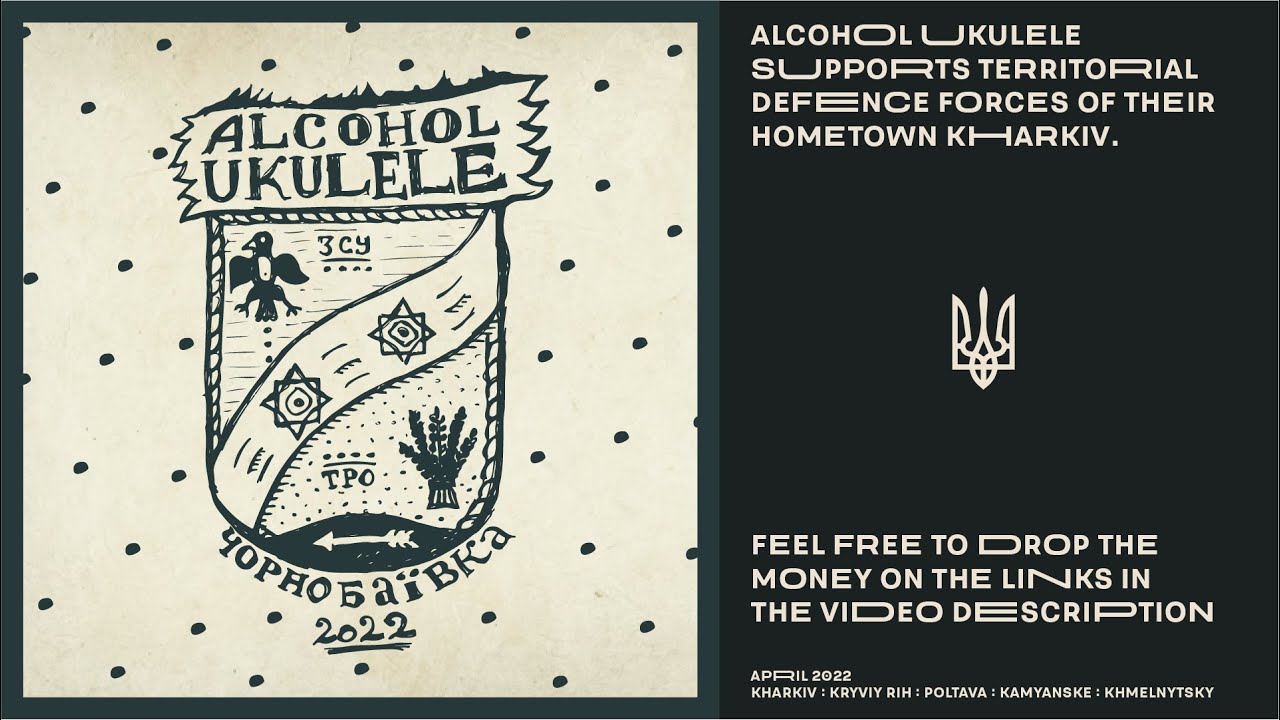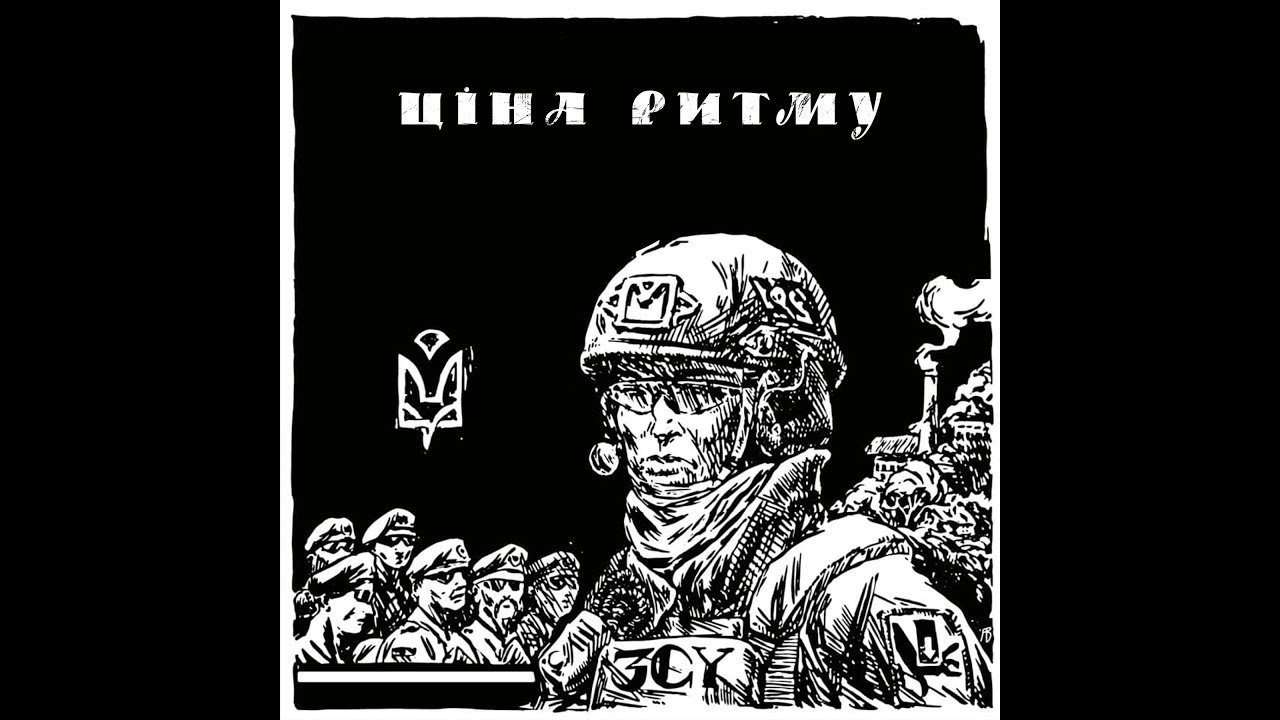“When my aunt gave her passport to the russian he asked, ‘Why are your hands shaking?’"
An eyewitness report from Novotroitske, occupied by russian troops
My name is Yaryna. I am the 30-year-old editor-in-chief of the biggest Ukrainian alternative music website, Neformat. You all know that Ukraine is at war with russia*. As I write, I’m full of hate, sorrow, hope and dozens of other emotions. It would be hard to explain this state of mind, even to the person I was before the invasion, but in a series of articles I will try to do so for the wider world.
I was lucky to be born in what has turned out to be one of the safest regions in this war. The far western town Uzhhorod hasn’t yet been bombed. I have my beloved partner, five cats, my parents and my vinyl and doll collections, my not-so-fancy flat, a few best friends and the job I love. But there is a price for my so-called happiness; the giant guilt of being alive and able to drink coffee in the nearest café, to listen to new Ukrainian music or just sleep without constant sirens and explosions. And every day I’m in a state of fear that I may still lose everything. Because you never know where the next russian bomb will fall.
Each day I scroll through Facebook or Instagram and try not to miss any important news from our musicians. Often I don’t know people personally, but because I’ve heard their names so often, it seems to me that I am connected with all these Ukrainians. I didn’t volunteer (I feel guilty for that too), so every day I persuade myself that my job is a form of moral support for my fellow people from the underground scene.
A lot of musicians have reacted by making music that deals with the war, and I have spent the last month or so compiling a wide picture of modern Ukrainian war music in this playlist.
You will see many names in that playlist, with many of the musicians’ fates being different. For instance, ПРАЩУР band founder Oleksa Bleedyi has stayed in Kharkiv, a big city in the eastern part of Ukraine. It has been heavily bombed since February and still remains one of the big targets for russian troops. Oleksa claims that he almost missed noticing it was spring because of the extent of the bombing, but he stays and supports his own city.
Then we have Nonsun from Lviv. Though the band is from a fairly safe area (Lviv is in the west and has ‘only’ been seriously bombed a few times), just two days after the band released their latest album Blood & Spirit, they received the news that their former guitarist was killed in a battle against russian occupiers.
At Neformat we write about different kinds of music – punk, metal, noise and experimental electronic music. Usually, we write news and reviews, gather playlists and make videos; all the usual music media stuff. Also, we promote concerts and have our own label. We’re continuing with many of those activities, but given that one of my colleagues, Yehor, just survived the occupation of Chernihiv and another, Alina, has had to move to Germany for an unknown period of time, and a third, Oleksandr, has ended up stuck in Poland, it’s pretty hard to be effective. Still, we do our best as Ukrainians to fight to preserve our culture. And our mission in these hard times is as important as it ever was; we must preserve our underground scene for future generations and show it to the world.
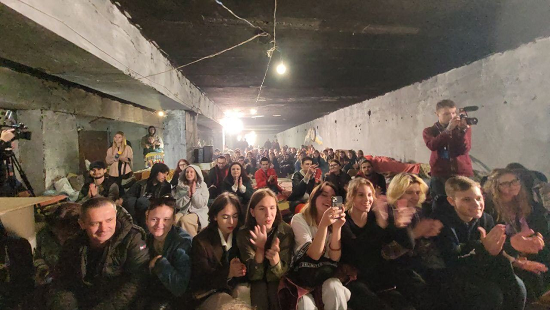
If you had asked me before February 24, whether people could make music during a large war, I would have said yes but I would have doubted to what scale. The truth is that the underground, the indie scene and even mainstream music have shown a hell of a lot of enthusiasm here. New songs appear both in relatively safe Lviv, where only some infrastructure was bombed, and in Kharkiv basements while russian troops destroy the city above them in the real time. The Javelins and Bayraktars, sunflower seeds, the ghost plane and many more symbols of this war find their place in the lyrics of these new songs.
Some members of the Kharkiv-based band Alcohol Ukulele had to stay in the city, living in really dangerous districts. Yurek Yackubov, one member of the band, fled to safer Kryvyi Rih, where he made a demo version of the song below, using only his MacBook microphone. The rest of the band including those staying in Kharkiv wrote their parts on smartphones and then Eugene Manko from La Horsa Bianca using “shitty headphones”, a bluetooth speaker, and a laptop speaker, mixed and mastered everything.
After that Yurek decided to create another song about air raid sirens and asked his friends on Twitter to record their voices for it. He saw it as a “story about removing emotional blocks” and a way of bringing some therapy to people in need. “Even when you sing about such enticing things as [air raid sirens] in an ironic context, it gives at least some way of going through this shit. Some people wrote back saying they managed to sing for the first time in forty days.”
One of the big western cities, Lviv is pretty safe despite a few bombings, although the emotions musicians want to express are the same as elsewhere. “Lviv is quite calm, so the recording process has not changed, but the themes did,” claims rapper Довгий Пес (which translates as Long Dog). Now nothing comes to mind except “aggression against the orcs” and sympathy for the people who suffered from huilo (putin) and his accomplices. “We continue to write because we need to make music that Ukrainians will listen to both during and after the fighting. We hold the cultural front.”
The artists from Nova Kakhovka are my total heroes. I wrote about this talented scene in my first article for tQ, and they are the ones whom I think the most about these days. Despite living under occupation from day one, they still manage to create music. According to the latest release statement from the Despot label (founded by Kadaitcha, Starless, Kojoohar and others), “The initial physical and psychological shock and pressure transformed into despair and frustration or bursts of anger and rage. We decided to record this period of time in a small but heavy release.” If we lose at least one musician from this scene, it will be an irreplaceable loss for Ukrainian culture.
Concerts in wartime? What? Concerts during the war? How dare you! That was the reaction of some Facebook users to the news from the Ukrainian ministry of culture, which officially allowed concerts and other cultural events to go ahead from April 1. Obviously the concert must be in a safe space with bomb shelters, and part of the money must go to the army, but this is what the state thinks: “Culture is a soft power. It is able to help return Ukrainians to a normal life in the new military reality.” Reactions to such news included: “I wouldn’t be able to relax in these conditions” or “I wouldn’t like to play in such a venue.” Many agree that raising money for the army by holding concerts in safer towns and cities is a normal thing to do. But for some other musicians, who are not so safe, playing music is simply a necessity.
Sasha Kladbische from the band Zwyntar has been in Kyiv since the beginning of the war. On the afternoon of February 23, she arrived back from India, and the next night heard the first explosions. But she decided to stay and help with volunteer assistance to the military and humanitarian aid. Once the city got used to “war mode” Kladbische contacted her friend, the co-owner of Squat17b and proposed a concert to raise money for Medevac and for Hospitallers (a battalion of military medics working on the front line). Support came from friends such as Misha and Andrew and Tash and Tonya, the girls from the Folkulaka project. Tonya came from Lviv, although she is busy volunteering there. Almost six thousand dollars was raised and medics from the battalion were also at the gig. But for Sasha “it was also important to hear that people said they felt alive for the first time since the war began”.
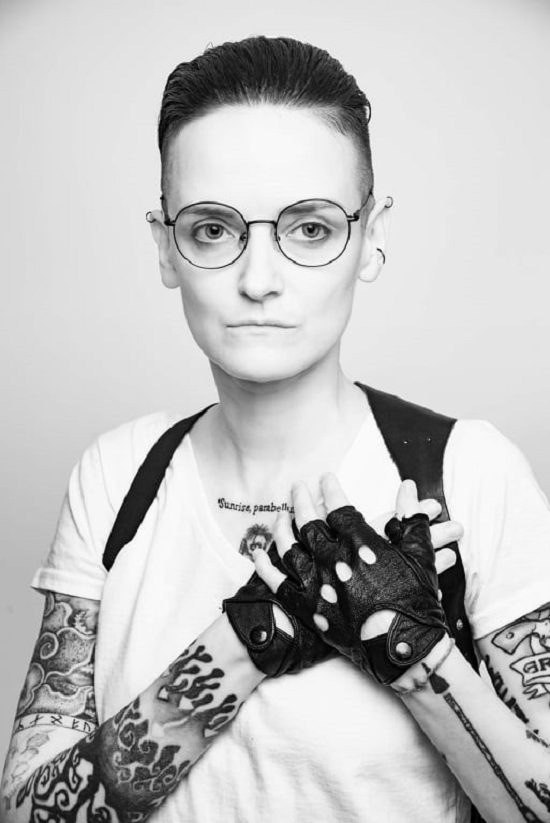
Sasha Kladbische
The punk scene in the west also got active. There was a concert in Lviv on April 16. From what I know Mauser, Bezlad and УВАГА attracted nearly two hundred people and raised 700 dollars for the army; a good result for a punk concert and enough money to partially equip a soldier.
To tell the truth, the ministry of culture has just legalised concerts or theatrical shows for bigger institutions. We already had smaller performances happening in the Kharkiv metro or stand-up shows in the Sumy bomb shelters. One of the most famous Ukrainian musicians Sviatoslav Vakarchuk (Океан Ельзи) has spent the war travelling throughout the country playing his songs for everyone who needs his music.
Some clubs couldn’t go on with their routine so started organising online concerts. The practical measures instituted during the pandemic were used again, for example, in the Odesa-based More Music Club. Bartender and concert organiser Dmytro Bondar says: “There is no kitchen in the club so we couldn’t feed anyone and the club’s location is also used as a headquarters for defence. So we decided to go back to our ‘usual business’, namely online concerts, raising funds for volunteer organisations that supply the Armed Forces and the territorial defence throughout the Odesa region.” Mainly Odesa-based bands like Drop The Roof, Floodlight, Cheshires, Kingpin, Wild Weed, Rudnic Ore and Concrete Control have already performed and those online concerts brought in around 800 dollars.
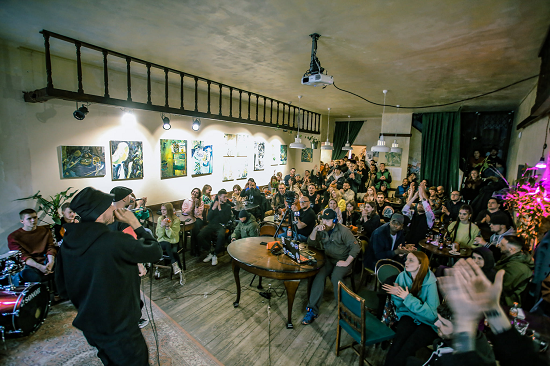
I should add that many musicians who were abroad in February have used their skills to raise money for Ukraine. One of them is singer-songwriter Kostiantyn Pochtar, aka Postman. Now based in Wrocław, Kostiantyn toured Poland to support Ukraine: “The #StandWithUkraine tour in Poland was organised by Borówka Music, a concert agency. It was twenty-three gigs in twenty-seven days, and booked in under 24 hours. We managed to raise a decent amount of money, and we sent it directly to the volunteers in Kyiv. They could use it quickly and effectively.”
There is a small discussion here about whether giving concerts is more effective than fighting itself, but I think many of us would agree with Postman. Playing concerts abroad as a Ukrainian is now not only about earning money but also about informing your listeners, talking to them, raising our problems again and again, because we simply can’t let the world forget about us.
*(Thanks to war, this is the common way Russia is spelled by Ukrainians.)

